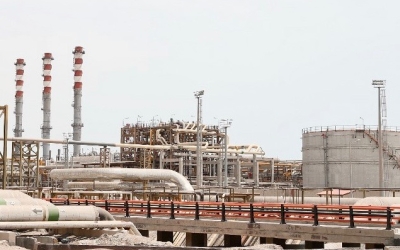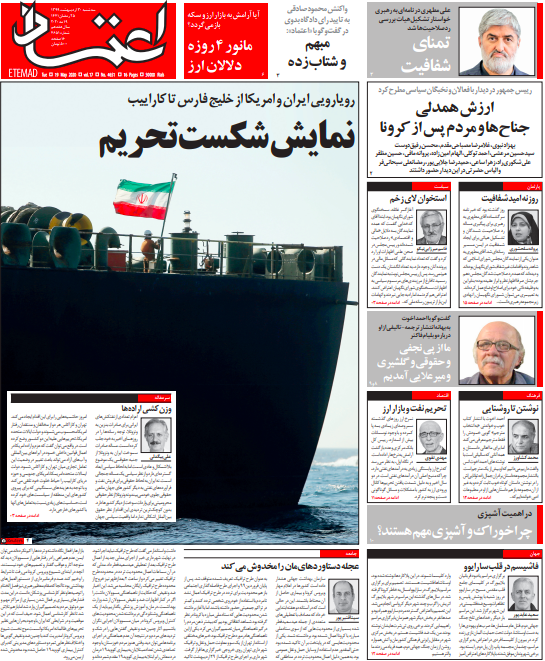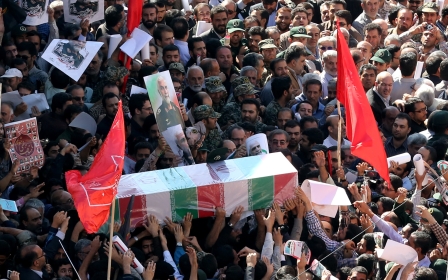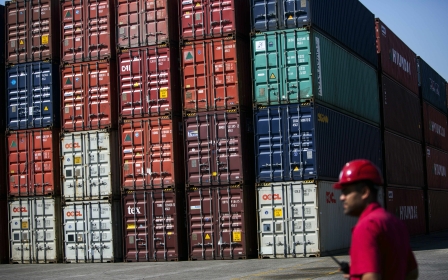Iranian press review: Newspapers praise fuel exports to Venezuela, despite Trump's threats
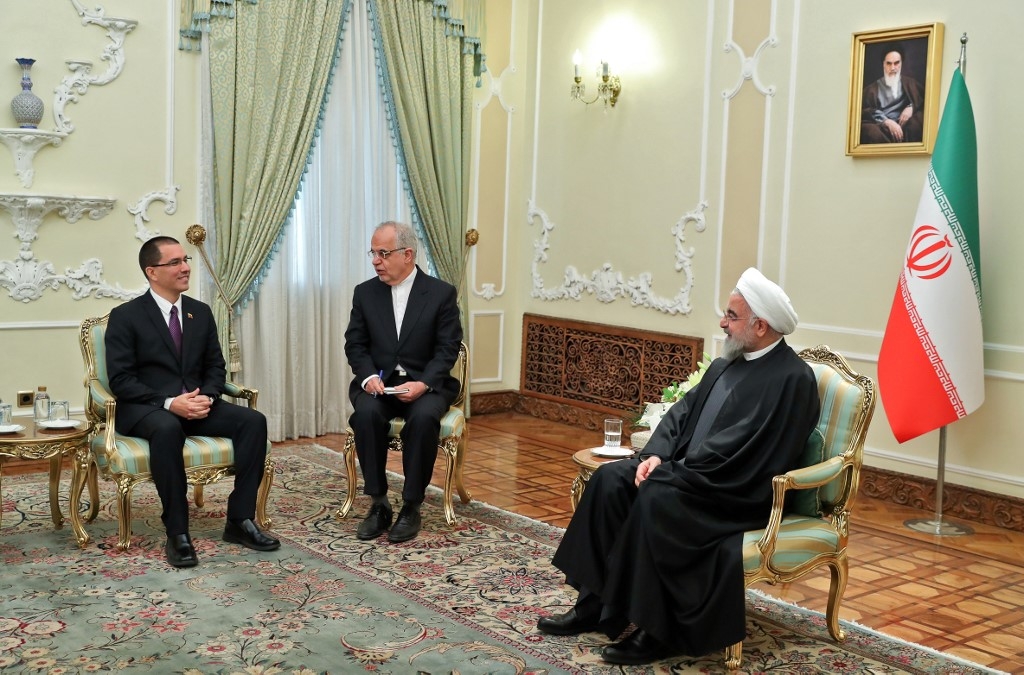
Papers hail attempt to export fuel to Venezuela
Analysts in Tehran have suggested that Washington is attempting to create a new tension with Iran, by threatening Iranian tankers exporting fuel to Venezuela, to redirect American public opinion away from the mismanagement of the coronavirus pandemic in the United States.
“The widespread coronavirus outbreak in the US, and its subsequent economic crisis have forced Trump to escape to danger,” the Ebtekar daily wrote.
The daily also suggested that, ahead of the US November presidential elections, Donald Trump is using the occasion to prove the success of his maximum pressure policy against Iran and Venezuela.
In recent days, four Iranian tankers have crossed the Strait of Gilberta, sailing to Venezuela. A fifth tanker also crossed the Suez Canal and is en route to Gilberta, Fars news agency reported.
New MEE newsletter: Jerusalem Dispatch
Sign up to get the latest insights and analysis on Israel-Palestine, alongside Turkey Unpacked and other MEE newsletters
While a senior member of the Trump administration told Reuters that the US was considering measures in response to Iran’s fuel export to Venezuela, officials in Tehran warned that any threat to Iranian tankers will receive a “quick and decisive response”.
Iranian outlets from across the political spectrum have hailed the decision to export fuel to Venezuela as a strong reaction to US unilateral sanctions on Iran’s banking system and exports.
The ultra-conservative Kayan daily predicted that the US will not stop the tankers, because in previous incidents, like the seizure of the Iranian-flagged tanker Grace 1, Iran demonstrated its readiness to proportionally respond to any threat to its interests.
In July 2019, Grace 1 was sized by the UK at the Strait of Gilberta, and few days later Islamic Revolutionary Guard Corps (IRGC) detained a British-flagged tanker in the Strait of Hormuz. The stand-off between the two countries ended two months later, following the release of both tankers.
On Tuesday, the pro-reformist Etemad daily published a photo on its front page of an Iranian oil tanker under the headline: “[A] demonstration of sanctions failure.”
Iranian analyst Ali Bigdeli, in an editorial for the daily, applauded Iran’s policy to choose a type of international trade to show the illegitimacy of US sanctions. Bigdeli also underlined that Trump would be tempted to seize the Iranian tankers in the Caribbean and use it as a show of power in his presidential elections campaign.
Meanwhile, many ordinary Iranians, tired of the US's devastating sanctions, turned to social media platforms to express their backing for Iranian authorities’ move as a successful policy.
“With the backing of its ballistic missiles capabilities, Iran is shattering US sanctions in daylight,” one Iranian wrote on Twitter.
Hard-liners should pay compensation for UK embassy attack
News about a £1.3m compensation that Iran has to pay to the UK for the 2011 attack on the British embassy to Iran have sparked wariness about the possible radical behaviour of the new parliament which will open next week.
In November 2011, members of the hard-line Basij militia stormed the UK embassy in Tehran, after new sanctions were imposed on Iran and following rising tensions between Iran and Western powers during the presidency of Mahmoud Ahmadinejad.
The attack, supported by the Iranian parliament which back then was controlled by the hardliners, led to a three-year suspension of full diplomatic relations between the two countries. Tehran and London restored relations when the moderate president Hassan Rouhani came into power.
Last week, Iranian legislator Ahmad Mazani recalled the incident in a parliamentary speech and asked why Iranian taxpayers should pay the price of the actions promoted and carried out by hard-line politicians and their supporters.
However, Iranian Foreign Minister Mohammad Javad Zarif said that no compensation has yet been paid to the UK, and various outlets have taken the occasion to warn the hard-liners, who control the new parliament, about the outcomes of radical polices.
“Back then, many names [of lawmakers] were announced as the supporters of the attack, and maybe now those people must find themselves responsible for the damages [they caused],” wrote the pro-reformist Ebtekar daily.
“The [Iranian] nation opposed the attack, which was against international and diplomatic laws, and should not pay for the damages that a rogue group has caused,” the daily concluded.
Drug addicts, sex workers said to be main child sellers in Iran
An investigative piece about the price, condition and the circle of people who are engaged in child selling in Tehran has once again brought this issue into the spotlight.
According to Ensaf News, children are being traded with prices between 10 and 100 million Iranian rial ($65 and $650) in poor neighbourhoods of southern Tehran. The report says that parents who are drug addicts and sex workers are the main child sellers.
Ensaf News journalist Nastaran Farkheh, who made contacts with a circle of child sellers as a buyer, wrote that the middlemen organising the trade are also addicts or criminals freshly released from the prison.
“The price of babies differs based on their parents,” Farkheh quoted Asghar, a middleman, as saying.
“The addict parents’ baby won’t cost more than 10 million [rial], they just want to get rid of the baby and get some money to buy drugs.”
After a few days, Asghar connected the journalist offering a one-year-old girl for 10,000,000 rial. He said that, the girl was the fourth child of a single mother who could not afford covering the basic cost of living with four children.
On Tuesday, in a news conference, Iranian judiciary spokesperson Gholamhossein Esmaili downplayed the investigative report, saying that in recent months only one case of child selling was reported, in which no organised group was involved.
In recent years, Iranian media have covered various stories on this topic, but no official statistics or report about child selling in Iran has yet been released.
* Iranian press review is a digest of reports that are not independently verified as accurate by Middle East Eye
Middle East Eye delivers independent and unrivalled coverage and analysis of the Middle East, North Africa and beyond. To learn more about republishing this content and the associated fees, please fill out this form. More about MEE can be found here.


